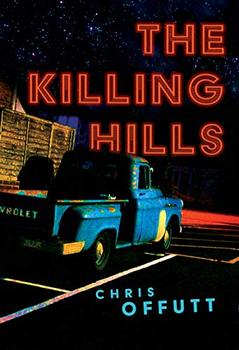Summary | Excerpt | Reviews | Beyond the Book | Read-Alikes | Genres & Themes | Author Bio

The Mick Hardin Novels #1
by Chris OffuttThis article relates to The Killing Hills
In The Killing Hills, which takes place in Kentucky, misogyny manifests in attitudes toward key female characters, notably the town sheriff. Additionally, the act of femicide is a central theme and a reminder of cultural aspects of female subjugation, including the murder ballad, a song format that is notably popular as a sub-genre of Appalachian folk music.
The origins of the murder ballad can be traced back to regions of Britain and Scandinavia, and became part of an oral tradition imported to the United States by British migrants who settled in Appalachia. One of the earliest examples of the song form, "The Twa Sisters" (The Two Sisters), is known to have existed in Britain as far back as 1656. It tells the story of one sister murdering another due to jealousy, and has spawned many versions, including one that emerged in Kentucky in 1917. While the murder is not committed by a man, the song tells of a male suitor who is the source of the sisters' rivalry. Thus, femicide in this type of song was present from the form's very inception. Other classic examples of the murder ballad include "On the Banks of the Ohio," "Knoxville Girl" and "Pretty Polly."
Whether based on historical fact – as some murder ballads are – or completely fictional, these songs often share one common denominator: misogyny. Subjects such as unwanted pregnancies, violence against women, male jealousy and its consequences, and gendered killing — frequently by drowning — all pervade the genre. The shame of unwed mothers who get their comeuppance is a particularly common theme, and the female subject of the ballad often suffers violence at the hands of a man, as in "On the Banks of the Ohio."
However, over time, the murder ballad has evolved. In Dolly Parton's "The Bridge," for example, a female speaker, pregnant and deserted by her lover, returns to the bridge where they met to kill herself. While this ballad is still freighted with traditional characteristics such as death by drowning and unwanted pregnancy, there are two crucial developments: Firstly, there is a female first-person perspective, which enables the listener to empathize with the protagonist in her last moments; secondly, she drowns of her own volition. Nevertheless, although the subject is not directly murdered by her male lover, the stigma he leaves her to deal with is clearly the source of her decision to take her own life.
Some recent songs have put a more feminist slant on the murder ballad. Hurray for the Riff Raff's "The Body Electric" uses the murder ballad format to critique indifference towards misogynistic violence, noting, "the whole world sings/Like there's nothing going on." Taylor Swift's "No Body, No Crime" hints at a woman hitting back against femicide. The song "Goodbye Earl," popularized by The Chicks (formerly known as The Dixie Chicks) in 2000, highlights the vengeful consequences of relentless domestic abuse: the female friends in the ballad plot to get away with the murder of the abusive husband in question. (The B-side of this song was — ironically — "Stand By Your Man"!)
Filed under Music and the Arts
![]() This "beyond the book article" relates to The Killing Hills. It originally ran in July 2021 and has been updated for the
June 2022 paperback edition.
Go to magazine.
This "beyond the book article" relates to The Killing Hills. It originally ran in July 2021 and has been updated for the
June 2022 paperback edition.
Go to magazine.
Your guide toexceptional books
BookBrowse seeks out and recommends the best in contemporary fiction and nonfiction—books that not only engage and entertain but also deepen our understanding of ourselves and the world around us.